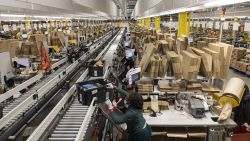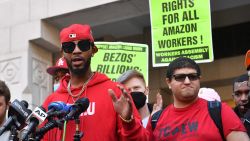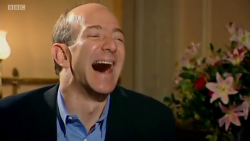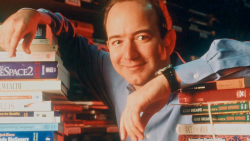As Amazon marks its 25th year, the groundbreaking company is dealing with a host of controversy and problems. High-powered officials are challenging its size and calling for it to be broken up. Politicians are raising questions about its worker pay. And Amazon faces growing competition from rivals. The Seattle-based company, whose dominance now reaches around the world, could be facing a quarter-life crisis.
Elizabeth Warren calls for a breakup
Senator Elizabeth Warren doesn’t like what she sees in Big Tech. The Democratic presidential candidate released a plan to break up giant companies like Amazon (AMZN). She wants to impose new rules on certain kinds of tech companies that have $25 billion or more in annual revenue, and unwind some high-profile mergers such as Amazon (AMZN)’s $13.7 billion purchase of Whole Foods.
“Today’s big tech companies have too much power – too much power over our economy, our society, and our democracy. They’ve bulldozed competition, used our private information for profit, and tilted the playing field against everyone else. And in the process, they have hurt small businesses and stifled innovation,” Warren wrote in a Mediumblog post published in March.
AOC slams Jeff Bezos’ pay
Rep. Alexandria Ocasio-Cortez has slammed Amazon CEO Bezos for being a billionaire while his company pays its warehouse workers what she called “starvation wages.”
She recently said in an interview with ABC News that the company’s low worker pay has helped make Bezos the world’s richest person.
In a response to the New York Democrat, Amazon said she is “just wrong.” The company says it pays a $15 minimum wage and offers full benefits to employees in their first days on the job. It also noted that it has lobbied to raise the federal minimum wage.
Senator Bernie Sanders has also made similar arguments against Amazon’s worker pay.
Biden questions Amazon’s taxes
Joe Biden knocked Amazon over the amount of corporate taxes it pays.
“I have nothing against Amazon, but no company pulling in billions of dollars of profits should pay a lower tax rate than firefighters and teachers. We need to reward work, not just wealth,” he said on Twitter. The tweet from the former vice president and Democratic presidential hopeful referenced a corporate tax rebate that Amazon received in 2018.
Amazon responded, sayingin a tweet that the companypays “every penny we owe.” It added: “Congress designed tax laws to encourage companies to reinvest in the American economy. We have $200B in investments since 2011 & 300K US jobs. Assume VP Biden’s complaint is w/ the tax code, not Amazon.”
Trump investigates post office deal
Amazon isn’t getting much reprieve from the Trump administration, thanks to the president’s beef with Amazon founder and CEO Jeff Bezos as well as the United States Postal Service.
Last year, Trump ordered a federal task force to investigate the Postal Service’s finances because he thinks Amazon takes advantage of the agency. At the root of all this drama is likely Bezos’ ownership of The Washington Post, which has published stories that are unfavorable of to Trump throughout his presidency.
Amazon has a confidential agreement with the Postal Service under which the agency delivers a large number of packages directly to the post office closest to their destination. The Postal Service then delivers the packages to customers.
Employees want to fix climate change
Amazon employees are putting pressure on the company to rethink how it contributes to the battle against global warming.
In April, a group of 3,500 employees signed a Medium post that urged Bezos to publicly outline the company’s plans to reduce carbon emissions and its reliance on fossil fuels. The signatories said that Amazon’s “sustainability goals lack context.”
Amazon unveiled in February a project it called Shipment Zero, which makes all packages net zero carbon and 50% of all shipments net zero by 2030. The company said it has 200 scientists, engineers, and product designers focused on sustainability efforts, from solar and wind farms to efforts around shipment waste.
Angering its hometown headquarters
Amazon publicly opposed a proposed a new “head tax” that the city of Seattle wanted to place on large businesses to address homelessness and fundaffordable housing. Companies would pay 26 cents per working hour for each employee it has in Seattle, or roughly $540 a year for every full-time employee.
The tax would’ve hit Amazon hard, since it’s the city’s largest private employer. It has more than 45,000 employees in the Washington city, so it would’ve paid more than $20 million a year. In response, Amazon temporarily halted construction of a new 17-floor tower.
The bill was scuttled and Seattle ended up passing a smaller version of the tax.
Problems with its HQ2
Amazon had to retreat from Long Island City in New York after it announced in February that it planned to build a second headquarters there. That news prompted lots of public outcry from both the public and local officials.
Amazon ditched its plans three months later, saying“a number of state and local politicians have made it clear that they oppose our presence.” Critics blasted the $1.525 billion in incentives New York offered to lure the tech behemoth and worried that it would soon lead to longtime residents being priced out of their homes.

Amazon ditches China
Amazon also pulled back from the world’s biggest market for online shopping, China. It closed its marketplace, meaning Amazon customers in the country will no longer be able to buy goods from Chinese merchants.
Amazon first entered the Chinese market 15 years ago, when it acquired an online book retailer, but it has struggled amid fierce competition. Research suggests that the company’s market share in China was miniscule compared to local rivals, like Alibaba (BABA).
Stamping out anti-vaxxers
A CNN Business investigation in February revealed that Amazon was offering lots of anti-vaccination content to people seeking information about the controversial topic. When asked about it, Amazon said it provides customers with “access to a variety of viewpoints, including books that some customers may find objectionable.”
Anti-vax material was also available on its Prime Video service. Days after the investigation published, Amazon began removing the anti-vaccine videos. But some books on the topic are still being sold despite the dangerous and unproven nature of the theory.






















